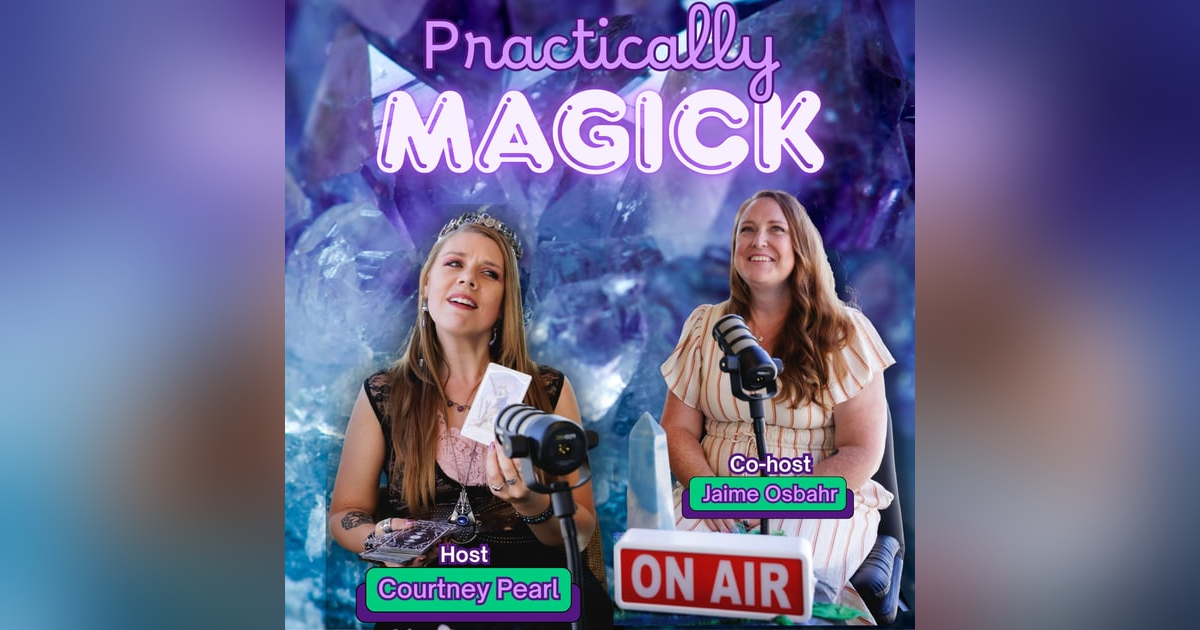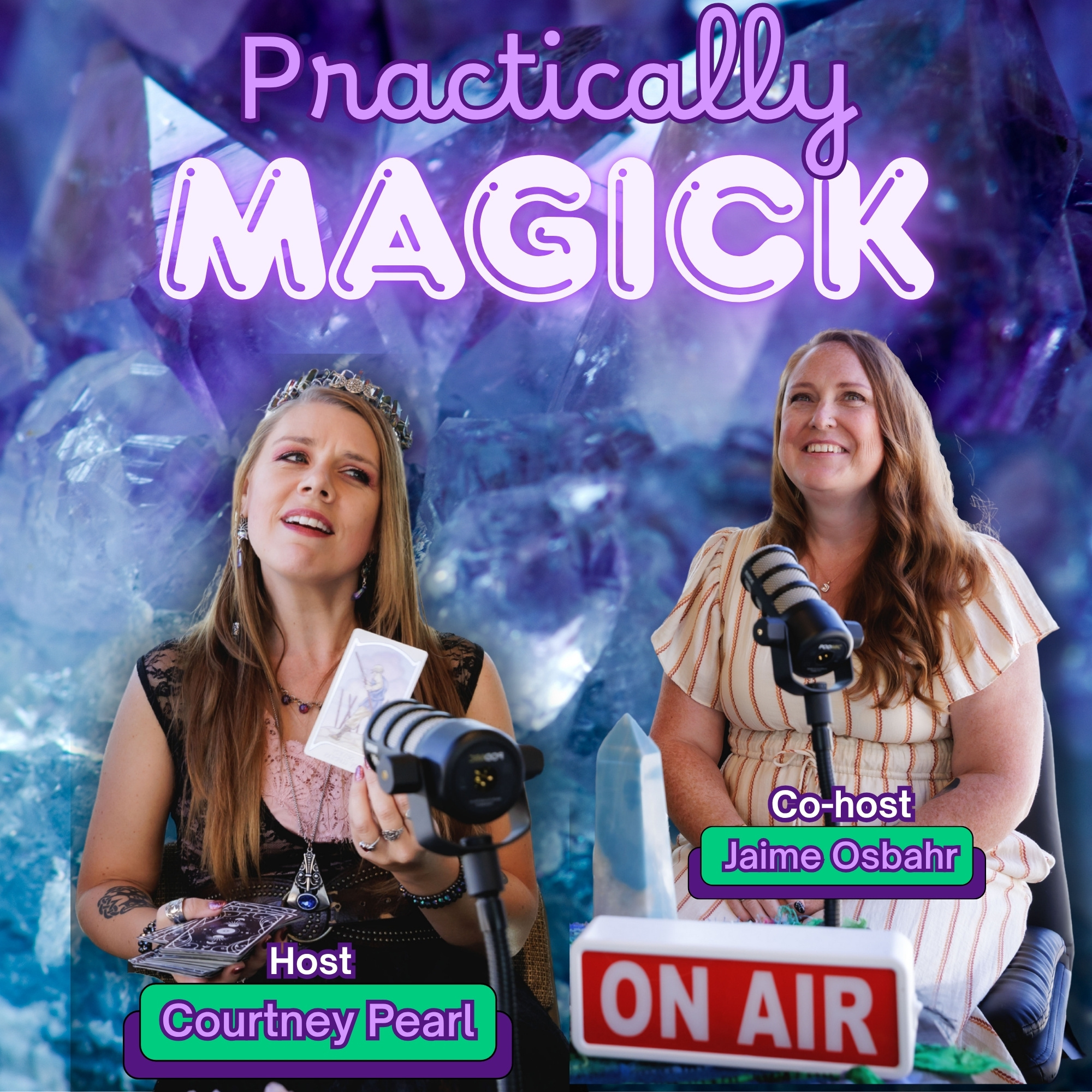The Body's Silent Language: How Trauma and Stress Manifest Physically
Welcome back to the Practically Magick blog! In this post, we're diving deep into a topic that's close to my heart and crucial for understanding our overall well-being: the profound connection between our emotional experiences and our physical health. We're exploring how trauma and stress leave their imprints on the body, often manifesting in ways that are subtle yet significantly impactful. This exploration is closely tied to our latest podcast episode, Trauma In The Body: Healing Through Magick, where we discussed these concepts with special attention to interpreting the significance of the Five of Wands card from the Ethereal Visions deck, the Selkie folktale, and the powerful role of alternative and magickal healing modalities. If you haven’t listened yet, I highly recommend checking it out! We'll delve into recognizing the body's silent screams and explore alternative healing modalities that address the body's memory of trauma. Prepare to embark on a journey of self-discovery and empowerment!
The Body's Silent Scream
Our bodies are incredibly intelligent systems, constantly communicating with us. However, we often miss or misinterpret the signals, especially when it comes to trauma and stress. Think of it as the body's way of screaming without uttering a sound. Trauma, whether it's a major event or a series of smaller, chronic stressors, gets stored within our tissues, nervous system, and even our cellular memory. This stored trauma doesn't simply vanish; it manifests in various physical symptoms, from chronic pain and digestive issues to autoimmune disorders and fatigue. The key is learning to listen to the body's silent scream and understanding what it's trying to tell us.
The Five of Wands: Interpreting Turmoil in Physical Ailments
In our podcast episode, we discussed the Five of Wands card from the Ethereal Visions tarot deck. This card often represents conflict, competition, and inner turmoil. When applied to physical ailments, the Five of Wands suggests that the symptoms we're experiencing might be a reflection of inner struggles or unresolved emotional conflicts. The chaos depicted in the card can mirror the confusion and frustration that often accompany chronic health issues, especially those rooted in trauma or stress. It reminds us that healing isn't just about addressing the physical symptoms but also about acknowledging and resolving the underlying emotional and psychological factors that contribute to our suffering. It underscores the importance of diagnosing and healing physical ailments that are tied to stress and trauma and encourages one to not just give up on the underlying issues.
Selkies and Self: Returning to Our True Form After Trauma
The Selkie folktale, a story about beings who can shift between seal and human form, offers a powerful metaphor for understanding trauma and healing. In the tale, a Selkie is often forced to stay in human form against their will, losing their connection to their true, wild self. Trauma can have a similar effect, causing us to disconnect from our authentic selves and adopt coping mechanisms that may be detrimental in the long run. The journey of healing from trauma is, in essence, a journey of returning to our true form, reclaiming our power, and reintegrating the parts of ourselves that have been fragmented or lost. By understanding the importance of recognizing how events and experiences embed themselves within our physical form, we can start taking active steps in re-discovering ourselves.
How Trauma and Stress Manifest Physically
The ways in which trauma and stress manifest physically are incredibly diverse and can vary greatly from person to person. Some common manifestations include:
- Chronic Pain: Trauma can sensitize the nervous system, leading to chronic pain conditions like fibromyalgia, back pain, and headaches.
- Digestive Issues: The gut-brain connection is well-established, and stress and trauma can disrupt the digestive system, leading to conditions like irritable bowel syndrome (IBS), bloating, and constipation.
- Autoimmune Disorders: Chronic stress can weaken the immune system, making us more susceptible to autoimmune disorders like rheumatoid arthritis, lupus, and Hashimoto's thyroiditis.
- Fatigue: Trauma can drain our energy reserves, leading to chronic fatigue syndrome (CFS) or simply feeling exhausted all the time.
- Anxiety and Depression: These mental health conditions are often linked to trauma and can manifest in physical symptoms like palpitations, sweating, and muscle tension.
- Sleep Disturbances: Trauma can disrupt sleep patterns, leading to insomnia, nightmares, and restless sleep.
- Skin Conditions: Stress can exacerbate skin conditions like eczema, psoriasis, and acne.
- Cardiovascular Problems: Chronic stress can increase the risk of heart disease, high blood pressure, and stroke.
It's important to remember that these are just a few examples, and the specific ways in which trauma and stress manifest physically can be highly individual. It's crucial to pay attention to your body's unique signals and seek professional help if you're experiencing persistent or unexplained symptoms.
Western vs. Eastern Medicine: A Holistic Healing Approach
Western medicine often focuses on treating the symptoms of a disease, while Eastern medicine emphasizes a more holistic approach that considers the whole person – body, mind, and spirit. In the context of trauma and stress, a holistic approach is essential for true healing. This means not only addressing the physical symptoms but also exploring the emotional, psychological, and spiritual factors that contribute to the condition. This holistic view encompasses emotional, spiritual, and physical well-being.
Western medicine can be valuable for diagnosis and treatment of specific physical ailments, but it may not always address the root causes of the problem, especially when it comes to trauma. Eastern medicine, on the other hand, offers a range of modalities that can help to release stored trauma and promote healing on all levels. These modalities include acupuncture, herbal medicine, yoga, meditation, and traditional Chinese medicine (TCM). By integrating both Western and Eastern approaches, we can create a more comprehensive and effective healing plan.
Emotional Energies: The Hidden Contributors to Physical Conditions
Emotions are energy in motion, and when these energies are suppressed or unresolved, they can become trapped in the body, contributing to physical conditions. For example, chronic anger can manifest as liver problems, while unresolved grief can affect the lungs. Fear can impact the kidneys, and worry can disrupt the spleen. Understanding the connection between specific emotions and their corresponding organ systems can provide valuable insights into the root causes of physical ailments. It is thus vital to recognize and address the hidden emotional energies that contribute to physical conditions.
Muscle Testing & Reiki: Identifying and Healing Emotional Issues
Muscle testing, also known as kinesiology, is a technique that uses the body's neuromuscular response to identify imbalances and blockages in the energy system. It can be used to uncover hidden emotional issues that may be contributing to physical symptoms. Reiki is a form of energy healing that promotes relaxation, reduces stress, and facilitates the body's natural healing abilities. It can be particularly helpful for releasing trapped emotions and restoring balance to the energy system. Methods like muscle testing and Reiki can be important tools for identifying and healing these issues.
Personal Stories: The Interplay Between Trauma, Stress, and Physical Manifestations
Let me share a few personal stories that illustrate the profound interplay between trauma, stress, and physical manifestations. I once worked with a client who had been struggling with chronic back pain for years. Despite numerous medical treatments, the pain persisted. Through energy work and emotional processing, we discovered that the pain was linked to unresolved grief and feelings of abandonment from her childhood. As she began to process these emotions, her back pain gradually subsided.
Another client came to me with severe digestive issues. She had been diagnosed with IBS and had tried various diets and medications with little success. Through muscle testing, we identified suppressed anger and resentment towards her partner. As she began to express these emotions in a healthy way, her digestive symptoms improved significantly.
These stories highlight the importance of addressing the emotional and psychological aspects of physical health. When we ignore our emotions, they find other ways to express themselves, often through physical symptoms.
Beyond Conventional Medicine: Alternative Healing Modalities
While conventional medicine plays a vital role in healthcare, it's not always the answer for everyone, especially when dealing with trauma and stress-related conditions. Alternative healing modalities offer a range of options that can complement or even replace conventional treatments. Some of these modalities include:
- Acupuncture: Stimulates specific points on the body to balance energy flow and promote healing.
- Herbal Medicine: Uses plants to treat a wide range of conditions.
- Yoga: Combines physical postures, breathing techniques, and meditation to promote physical and mental well-being.
- Meditation: Calms the mind and reduces stress.
- Energy Healing: Works with the body's energy field to promote healing.
- Hypnotherapy: Uses hypnosis to access the subconscious mind and address underlying issues.
- Somatic Experiencing: A body-oriented therapy that helps to release trauma stored in the body.
- EMDR (Eye Movement Desensitization and Reprocessing): A therapy that helps to process traumatic memories and reduce their emotional impact.
It's important to research different modalities and find practitioners who are qualified and experienced. Remember, healing is a journey, and it may take time to find the right combination of treatments that work for you.
Listener Q&A: Healing Emotional Immaturity
In the podcast episode, we addressed a listener question about healing emotional immaturity. Emotional immaturity can stem from various factors, including childhood trauma, lack of emotional support, and unresolved emotional issues. It can manifest in behaviors like impulsivity, difficulty regulating emotions, and problems with relationships.
Healing emotional immaturity requires self-awareness, a willingness to take responsibility for your actions, and a commitment to personal growth. Some strategies for healing emotional immaturity include:
- Therapy: Working with a therapist can help you to identify and process underlying emotional issues.
- Mindfulness: Practicing mindfulness can help you to become more aware of your thoughts and feelings.
- Self-Compassion: Treating yourself with kindness and understanding can help you to heal from past wounds.
- Setting Boundaries: Learning to set healthy boundaries can protect you from emotional overwhelm.
- Developing Emotional Intelligence: Improving your emotional intelligence can help you to understand and manage your emotions more effectively.
Healing emotional immaturity is a process that takes time and effort, but it's well worth it for the sake of your own well-being and your relationships with others. This includes understanding trauma, which is more than you think.
Generational and Ancestral Healing: Looking Ahead
Trauma can be passed down through generations, affecting not only our own lives but also the lives of our descendants. Generational and ancestral healing involves exploring and resolving the traumas that have been passed down through our family lines. This can be done through various modalities, including family constellation work, ancestral healing rituals, and energy healing. By healing our ancestral wounds, we can break free from patterns of suffering and create a more positive future for ourselves and our families.
Conclusion: Empowering Yourself Through Magick and Holistic Healing
The body truly speaks a silent language, one that's often overlooked in our fast-paced world. Understanding how trauma and stress manifest physically is the first step towards reclaiming our health and well-being. By embracing a holistic approach that integrates Western and Eastern medicine, alternative healing modalities, and emotional processing, we can unlock the body's innate healing potential. Remember, you are not alone in this journey. There are many resources and practitioners available to support you. As we discussed in our podcast episode, Trauma In The Body: Healing Through Magick, magick, and particularly our card reading of the Five of Wands from the Ethereal Visions deck, the Selkie folktale, and explorations into alternative methods and magickal healing offer profound insights. By listening, learning, and applying these principles, you can start empowering yourself through holistic healing, and begin to live a more vibrant, fulfilling life. Thank you for joining me on this journey!











